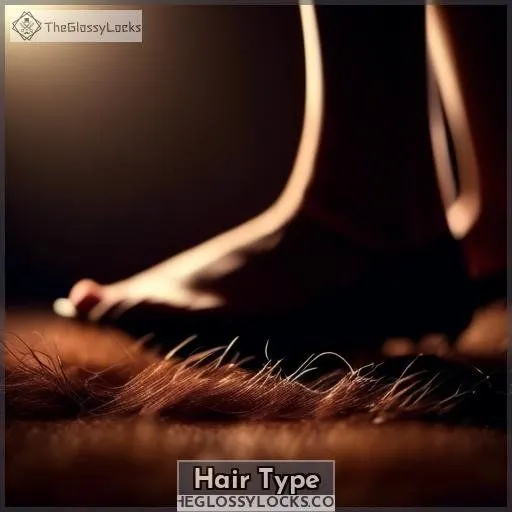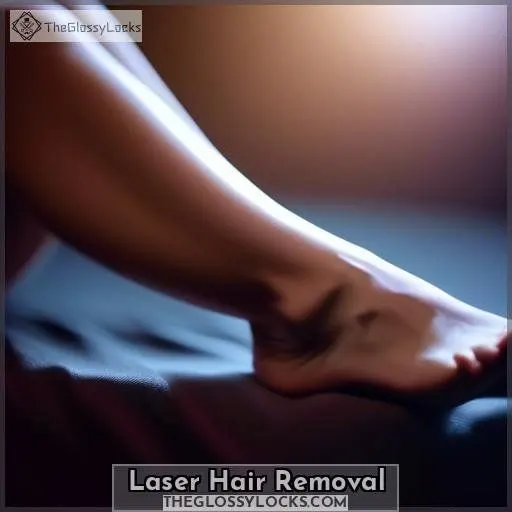This site is supported by our readers. We may earn a commission, at no cost to you, if you purchase through links.
Your leg hair may be growing faster than others due to a variety of factors. Genetics play a significant role, as people of African descent often have faster-growing hair. Hormonal imbalances, such as polycystic ovary syndrome (PCOS), can also accelerate hair growth.
Certain medications and medical conditions can contribute to rapid leg hair growth. Your hair type can also be a factor.
Improper shaving techniques and lack of hair removal methods like laser treatment may exacerbate the issue. To better understand the underlying cause of your fast-growing leg hair and explore effective management strategies, it’s best to investigate the details more thoroughly.
Table Of Contents
Key Takeaways
- Genetics play a significant role in determining leg hair growth rate, with people of African descent often having faster-growing hair due to higher hair follicle density.
- Hormonal imbalances, such as polycystic ovary syndrome (PCOS), can accelerate leg hair growth.
- Medications and medical conditions can also contribute to rapid leg hair growth.
- Improper shaving techniques and lack of hair removal methods like laser treatment may exacerbate the issue.
Why Does My Leg Hair Grow So Fast?
Your leg hair may grow faster than others due to various factors such as genetics, medical conditions, medications, hormonal imbalances, and lifestyle factors.
Genetic factors can influence both the amount and sensitivity of androgen to hair follicles, leading to varying hair growth rates.
Medical conditions like polycystic ovarian syndrome (PCOS) or thyroid issues can affect hormone production, causing excessive hair growth.
Certain medications, such as minoxidil or anabolic steroids, can also stimulate hair growth.
Additionally, lifestyle factors like diet, temperature settings, and skin quality can influence hair growth.
Genetics
Genetics play a significant role in determining your leg hair growth rate. Your ethnicity, hair color, texture, and thickness can all influence how fast your hair grows. For instance, people of African descent tend to have faster-growing hair due to their higher density of hair follicles.
Understanding your genetics can help you anticipate and manage your body hair growth cycles and rates. Remember, genetics are just one factor; other elements like hormones, medications, and medical conditions can also impact your hair growth.
Hormonal Imbalance
Hormonal fluctuations can markedly influence the growth trajectory of your leg hair. Here are three pivotal factors to bear in mind:
Hormonal shifts: As your body undergoes hormonal alterations, such as during menstruation or menopause, your hair growth pattern may be impacted, leading to accelerated or decelerated hair growth.
Body temperature: Elevated body temperature can invigorate hair growth, while diminished temperatures can impede it. This can be influenced by factors such as your surroundings, attire choices, and even your dietary regimen.
Topical remedies: Certain medications and topical treatments can impact the hair growth cycle, either accelerating or decelerating hair growth. This includes hormone-based medications and topical treatments for dermatological ailments.
Polycystic Ovary Syndrome (PCOS)
While hormonal imbalances can send your leg hair growth into overdrive, let’s zero in on a key culprit: PCOS. This syndrome jumbles up your body’s hormone levels, leading to a sprint in hair regrowth. If you’re noticing your leg hair is on a growth spurt, PCOS might be the backstage manager.
Symptoms like irregular cycles and stubborn acne can also join the party. Fear not, though—treatments and management strategies can help tame this hairy situation and restore some balance to your body’s natural rhythms.
Medications
Medications can greatly impact your leg hair growth. Some medications, like medications for high blood pressure, cancer treatments, cholesterol-lowering medications, blood thinners, depression treatments, and medications that boost testosterone, can affect your hair growth cycle, causing hair loss or changing its growth rate. Drug interactions and side effects of medications can also affect hair growth.
To address hair loss or unwanted hair growth caused by medications, consider the following:
- Identify the reason: Talk to your doctor to find out which medications may be causing your hair growth problems.
- Switch medications: If you can, talk to your doctor about other medications that may not have the same side effects on hair growth.
- Lifestyle changes: Improve your diet, reduce stress, and maintain a healthy lifestyle to support hair growth.
- Supplements: Think about taking vitamin and mineral supplements to make up for any deficiencies that could be causing hair loss.
Medical Conditions
Medical conditions can notably affect leg hair growth. Thyroid disorders, insulin resistance, and family history can all contribute to accelerated hair growth.
Anabolic steroids and corticosteroids, often used for medical purposes, can also increase hair growth.
Electrolysis, a permanent hair removal method, can be an effective solution for managing unwanted leg hair due to these medical conditions.
It is essential to consult with a healthcare professional to identify and address the underlying factors of your leg hair growth.
Hair Type
Your leg hair may grow faster than others due to several factors, including hair type. Hair growth patterns, hair follicle density, hair thickness, and hair texture can all influence the rate at which your leg hair grows. For example, if you have a high density of hair follicles in a particular area, you may notice faster hair growth in that region. Environmental factors, such as exposure to sunlight or changes in temperature, can also affect hair growth rates.
To determine the specific factors contributing to your fast leg hair growth, consider consulting a dermatologist or a hair growth specialist. They can help identify any underlying medical conditions or hormonal imbalances that may be affecting your hair growth cycle. Additionally, maintaining a healthy diet and taking vitamin supplements can support overall hair health and growth.
Improve Shaving Techniques
Improve Your Shaving Techniques:
- Warm Water and Lather: Start by shaving with warm water and a lather to soften the hair and open the pores, making it easier to shave.
- Apply Lotion: After shaving, apply lotion to soothe the skin and prevent irritation.
- Healthy Diet and Vitamin Supplements: Eating a healthy diet and taking vitamin supplements can help maintain skin health and potentially slow down hair growth.
Laser Hair Removal
If you’re tired of the daily shave and crave long-lasting smoothness, laser hair removal might just be your ticket to freedom. This high-tech method zaps away your worries along with the unwanted fuzz. Sure, it might pinch your wallet more than your skin, but the effectiveness is worth the cost. Imagine trading in your razor for a life of leisurely mornings. Here’s a quick breakdown to enlighten you:
| Laser Aspect | Benefit | Consideration |
|---|---|---|
| Effectiveness | Long-term results | Initial frequency |
| Discomfort | Minimal | Varies by individual |
| Cost | Investment pays off | Upfront expense |
Frequently Asked Questions (FAQs)
What causes excessive leg hair growth?
Your fast-growing leg hair may stem from genetics, hormonal changes, or medical conditions like PCOS. Understanding the root cause can help you manage excessive hair growth through targeted treatments and lifestyle adjustments.
How can I slow down leg hair growth?
To slow down your rampant leg hair growth, try these proven tips: shave less often, use a sharp razor, moisturize daily, and consider laser hair removal for long-lasting smoothness. You’ve got this!
Is there a way to permanently remove leg hair?
Electrolysis is the most effective way to permanently remove your leg hair. This targeted treatment disables hair follicles, stopping growth for good. It’s a personalized solution that’ll have you feeling smooth and confident.
How often should I shave my legs?
You’ll need to shave your legs every 3-5 days to keep them silky smooth. Factors like skin, hair type, and shaving technique all affect how fast your leg hair grows back. Stay on top of it, and you’ll be glowing!
Can diet affect leg hair growth?
You bet, your diet can absolutely affect how fast your leg hair grows! Nutrients like protein, iron, and zinc play a key role in hair growth. A balanced, nutrient-rich diet keeps your hair in top shape.
Conclusion
Unquestionably, the growth rate of your leg hair may be alarmingly rapid, resembling a rampant wildfire consuming everything in its wake. This accelerated development can be traced back to various causes, ranging from your genetic inheritance to hormonal disruptions and possibly even specific medications.
To quell this unruly growth, consider focused remedies such as refining your shaving methods or delving into laser hair removal. Bear in mind that unraveling the underlying factors contributing to your leg hair’s rapid growth is the initial step toward regaining command over the situation.












